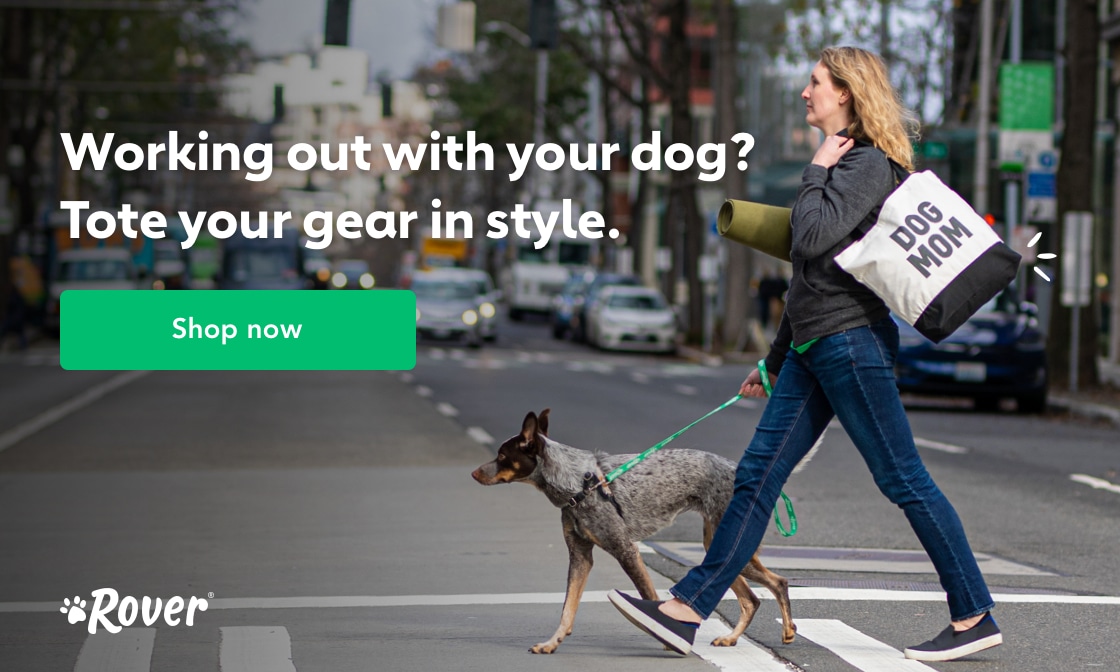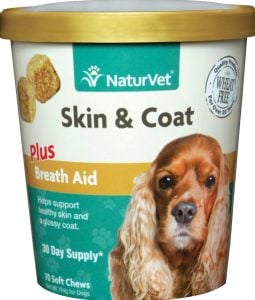Updated July 31, 2020 | Caring for Your Dog
By Nia Martin
- This post contains affiliate links. Read more here.
- Not a substitute for professional veterinary help.
Pet parents, you probably take a multivitamin every day that includes (or should include) zinc to support your metabolism, immune system, and even important functions like wound healing. But what about vitamin supplements for your dog? Do dogs even need a zinc supplement in addition to their food? Read on to learn about zinc supplements for dogs, and be sure to check with your veterinarian before introducing any new supplements to your dog’s diet.
Do You Need Zinc Supplements for Dogs?
- Your dog needs vitamins and organic compounds for balanced nutrition and normal growth. Zinc is an important part of your dog’s diet and contributes to them having healthy skin and fur, good thyroid function, and a healthy immune system. Dogs (like other animals and people) cannot produce vitamins and minerals naturally, so they have to consume foods that provide them. In the case of zinc, the highest content can be found in fresh meats, such as beef, beef liver, pork, turkey, and lamb.
According to Dr. Gary Richter, award-winning vet and member of Rover’s Dog People Panel, “All dogs are of the species Canis familiaris and as such have very similar nutritional needs.” Commercial dog food is specifically formulated to meet those needs. If your dog’s food is labeled “complete and balanced,” it contains all the vitamins and minerals your dog requires.
So, generally speaking, a well-balanced diet that includes a good-quality dog food is going to cover your dog’s zinc needs. But there are some exceptions, which we’ll explore next.
When to Give Your Dog Zinc Supplements
If a commercial dog food is formulated to provide your dog with her zinc requirements, why would you need to give them a supplement?
Dogs with specific health and wellness concerns may benefit from zinc supplements. Zinc-responsive dermatosis, in particular, is a result of zinc deficiency. A skin disease, its symptoms include lesions, hair loss, crusting, and scaling of the epidermis. There are two primary types: the first is breed-specific to Alaskan Malamutes, Siberian Huskies, and Samoyeds—a metabolic abnormality that affects intestinal absorption; and the second affects fast-growing, large-breed puppies whose diets are either deficient in, or inhibiting, proper zinc absorption.
Another consideration is whether your dog consumes a homemade, whole food diet (highly recommended by Richter). If so, you may not have access to the specific vitamins and minerals your pet needs. That’s where supplements, such as zinc, for dogs can also come in handy.
“It is a good idea to consult with a veterinarian regarding any questions about nutrition,” Richter notes. This is especially important when feeding your dog a homemade diet. Your vet may even refer you to a veterinary nutritionist to determine the best course of vitamins for your dog.
How to Choose Zinc Supplements for Dogs
- As noted, you should always talk to your veterinarian about what, if any, supplements your pet needs. In general, be aware that ingredients in some herbal supplements can interact with medication. Zinc is known to have several drug interactions in humans, including antibiotics, so it’s worth double-checking with your veterinarian if your dog is on any other supplements or medications. It’s also possible for dogs to have too much of certain vitamins, and zinc is one of them. Keep careful tabs on your dog’s zinc dosage to avoid zinc poisoning, which can be fatal.
Richter has some general guidelines on choosing supplements for dogs:
- Look for brands that have commissioned clinical studies of their products.
- Read labels carefully to ensure quality and safety.
- Look for a lot number on the product. This is a sign that the company uses quality control checks.
- Choose brands with confirmed expertise.
- Be wary of claims that sound too good to be true. Vitamin supplements are just that—supplements. They are not cure-alls or medications.
- Do not give human supplements to dogs, as they may contain ingredients that are harmful to dogs.
- In general, the best options will be available through your veterinarian.
The bottom line about zinc supplements for dogs: Talk to your vet first before introducing any nutritional supplement into your pet’s diet.
Zinc Supplements for Dogs
To address a health condition, see your veterinarian for prescription zinc supplements that can help. The over-the-counter supplement below contains zinc and is recommended by Richter, but primarily for prevention and maintenance.
This chewy supplement is formulated with zinc and makes for a yummy, healthy addition to your dog’s diet. Combined with biotin, omega-3 and -6 fatty acids, the formula helps keep your doggo’s skin and coat in good health.
As always, check with your veterinarian before introducing any new supplements to your dog’s diet. Read on for more information on how to best balance your dog’s nutrition.
Further Reading
Featured image by Mat Coulton/Pixabay
Nia Martin grew up with cats, dogs, horses, and a goldfish that lived for eight years. Based in Seattle, her writing and photography have appeared in Seattle magazine, The Seattle Times, The Fold, Cascadia Magazine, and Bitterroot Magazine, among others. When not working, you can find her petting dogs and visiting her family’s charismatic tabby, William of Orange.
The Dog People Newsletter
Sign up and get $25 off pet sitting and dog walking!

